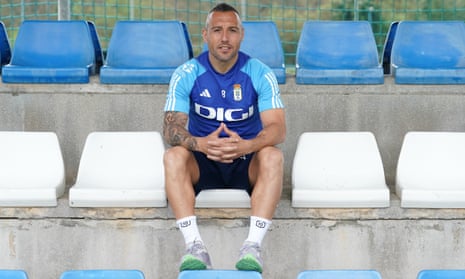The day Spain’s history changed for ever, Santi Cazorla scored in the shootout. He scored on his Recreativo de Huelva debut in 2006, the first of 143 goals going back 18 years, got his last for Arsenal in front of 59,962 at the Emirates in autumn 2016, and netted a 96th-minute equaliser in Moscow 754 days and 10 operations later, having been told to settle for walking again. He scored in the FA Cup final at Wembley, at the Santiago Bernabéu and the Camp Nou, at Old Trafford and Anfield, in the north London derby and at San Mamés, a place so revered they call it the Cathedral.
Nothing, though, compared to a deflected shot in front of 3,823 people on a random Saturday afternoon against tiny Alcorcón in the second division, and which didn’t even count. “The goal I’ve lived with most feeling,” Cazorla calls it, a VAR review ruining everything. “And I had already celebrated.”
A couple of weeks have passed and Cazorla is laughing now – he is almost always laughing – as he pictures himself running to the fans. Engulfed by them, when he emerged he lifted the badge and kissed it. And that was when he saw the referee. “He said: ‘I’m really sorry to rule this out.’ He was from Huelva and said: ‘We have great memories of you.’ But, you know what? Nothing can take that moment away, even if VAR did. I’ve spoken to people in the stands and the experience was so real, so authentic, it will always be there. My first professional goal in this shirt: I’d waited a very, very long time.” His entire life, in fact.
Cazorla sits in the dressing room at Requexón, Real Oviedo’s training ground down a narrow lane surrounded by farmland. He knows this place well. This is where he grew up, the local team he joined at eight, watching his heroes: Carlos Munoz, Slavisa Jokanovic, Robert Prosinecki, Petr Dubovsky. Oviedo are who he always wanted to play for, but with the club in crisis, falling as far as the fourth tier and the verge of folding, he never could. Until last summer; 30 years since he first arrived, 20 since leaving against his will, having bought shares in their hour of need, he returned. In the second division, and on the minimum wage, €93,000 (£80,000). On a mission, too.
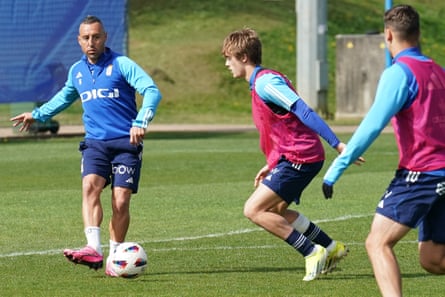
“I would play for free but you’re not allowed,” Cazorla says. “They made a good offer. My wife said: ‘No, no, you’re not going to Oviedo to earn, you’re going home to enjoy it, to help, to give.’ I called my agent: ‘I don’t want any money.’ I told the president: minimum salary, 10% of shirt sales to the academy. It was done that night.”
A double European champion with Spain, Cazorla played in Europe with Arsenal, Villarreal and Málaga. Now his target is to take Oviedo back to Primera, 23 years after they were last there. It is, he says, “the greatest challenge I’ve had”.
“I’ve been treated so well everywhere – at Arsenal everyone loves me, at Villarreal the same, at Recre, at Málaga … but the feeling and responsibility is deeper. People called it a step back, nothing to gain, but it’s the complete opposite. The responsibility is being up to that. I don’t want to be the guy who came to sell shirts or because he was a symbol of the academy; I want to be a footballer.
“That responsibility weighs,” Cazorla admits. “I was a bit scared at first. You don’t know if you’re good enough, which still happens: I’m not at the same level, especially physically. You come at 38, from three years in a lesser league. I had a pubis problem, hardly did pre-season, and the team was struggling. I felt even worse because I couldn’t help.”
Seven weeks in, with Cazorla having played one minute, Oviedo were second bottom in Segunda División. Now they occupy a playoff place, three points off automatic promotion. Despite being denied his goal in Alcorcón and a minor injury over the last fortnight, he’s at the heart of the revival. Watch him and some things never change, the talent timeless. Some things, though, do. “The slightest kick, opponents say sorry. They didn’t respect me so much before,” he says, cracking up.
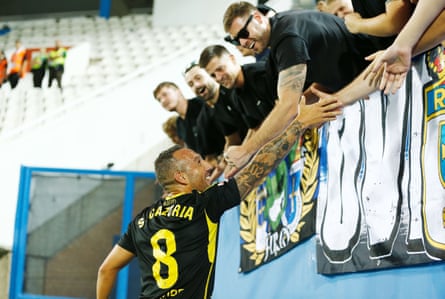
There’s been affection, respect, appreciation. Lots of shirt requests, too. “If you win, you get one free, another you pay for; if you lose, you pay for both,” he says. “I always give away both. I feel bad: I wish I could give more.” At every ground, meanwhile, there is applause, warmth, and that’s the opposing fans. Where Cazorla played, the legacy is greater. A picture recently appeared in which he and Isco are watched by Brahim Díaz, a Málaga ballboy that day. “There’s a touch of melancholy seeing that but kids looking up to you, taking inspiration, is the nicest thing in football,” Cazorla says.
There is nostalgia for north London, too. The last time Cazorla was at the Emirates Stadium was April 2018, when he asked to train on the pitch. “I really want to go back,” he says. “I owe them a lot, they hold a special place. I also have a great friend there.”
after newsletter promotion
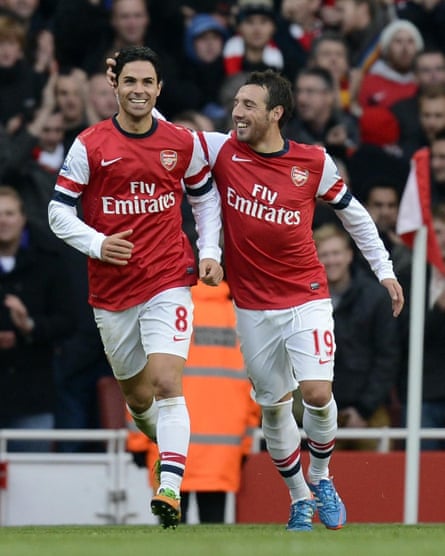
There’s a grin. Cazorla saw Mikel Arteta’s managerial potential before anyone and it was bloody annoying. “Injured, watching games together, he would get the remote and pause it. ‘What are you doing?’ He would say: ‘Go back, go back’, rewind 30 seconds, and ask: ‘What do you see?’ ‘I see a paused screen! What do you want me to see?!’ He would say: ‘Look at this guy here, how badly he’s positioned. If he goes here, and he goes there, this space opens’. Every game, pausing every 20 seconds. The match has finished and we’re still in the 20th minute. I’m thinking: ‘What’s with this guy?’
“He sees it. I love football but I don’t. I think it’s a gift. He’s pausing. ‘Can’t you see we’re doing this badly? Don’t you think the left-back should be deeper? That he should draw out his marker? Don’t you think we can create a space there?’ I said yes to everything: ‘Yes, you’re completely right, Mikel. Now, press play.’ I’d say: ‘Mate, you’re a coach already.’ He said: ‘Yeah, I see things that make me think I should be.’ We talked a lot. He still loved playing, but working with Pep Guardiola at [Manchester] City was an opportunity, the best apprenticeship. I said: ‘Mikel, if that’s what moves you, go for it. It’s worked out well.
“Mikel has changed their [Arsenal’s] mentality. When I was there, something was missing. Mikel changed that and they have an incredible squad. I love [Martin] Ødegaard and see myself in him: like him, I found a coach [Arsène Wenger] who gave me confidence. He made me captain before I could say ‘hola’ in English. Declan Rice reminds me of Aaron Ramsey, appearing everywhere, a brutal player. Arsenal are clear candidates for the league.”
Arteta heads a list of former teammates making their way as managers – “Xabi Alonso always had a calmness I found astonishing” – and Cazorla is convinced more are coming: Álvaro Arbeloa, Fernando Torres and Pepe Reina. But he’s not sure it’s for him: reports he would join Barcelona’s staff are laughed at and he has seen how thankless a task it can be, Xavi resigning from a “cruel and unpleasant” job. He saw it with Wenger too.
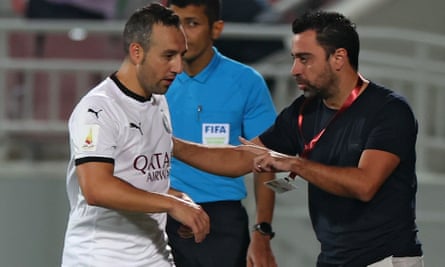
“Arsène was Arsenal’s most important coach in history, winning the league, the Cup, always qualifying for the Champions League despite them selling players every summer, but football has no memory. That’s very sad,” Cazorla says. “Xavi’s case is like me and Oviedo. He apologised for leaving me alone in Qatar [at Al Sadd], and it wasn’t the same after, but he said: ‘Santi, it’s my dream, very personal.’ It’s sad he’s suffering in his own home, undervalued. He arrived at one of the hardest moments in their history, won the league and Super Cup, but it’s never enough.”
“Xavi surprised me. As a player he never raised his voice and now …” Cazorla continues, laughing. “The first day we were losing. I watched him throw boots about, swearing, shouting. I’m thinking: ‘Someone’s swapped the guy I knew for someone else.’ I asked later: ‘Xavi, what happened to you today?!’ He says: ‘I’ve changed completely. If you don’t, the dressing room doesn’t respect you.’ I thought: ‘You really have to?’ I don’t see that in me, but then I didn’t see it in him, either. I have to think about it. Maybe sporting director.”
That can wait. Cazorla still has a mission, football to play, at least until June. “Then we’ll sit down, see what the club want, what I can give. I really don’t know what we’ll do. I’m not looking beyond this season, trying to reach Primera, which Oviedo deserves. Nothing else matters. My decision won’t depend on the division we’re in. If me retiring meant Oviedo going up, I wouldn’t even play this weekend.”
If they did, it would be up there alongside anything he ever achieved. “Alongside? No. Above,” Cazorla says. “It’s different: coming home and achieving something this club has waited for so long would be special.”
“Games don’t hurt; it’s more day to day,” he added. “I don’t limp around the supermarket … I don’t want anyone to know. I suffer when my mind starts overworking, thinking I could miss the weekend. When it comes, it’s a joy to play at home. There’s pressure, but I’m loving it. Against Alcorcón, we lost 1-0. You feel awful. Fans travelled a long way. As a kid it’s a game with mates; as a professional, you know people are affected, going home pissed off. That’s the pity. You feel guilty, you’re letting people down.”
I tell Cazorla that he did not let anyone down. “No, the VAR did,” he says with a grin. “There’s a responsibility but I tell the kids: enjoy this. I do, a lot. You have to. The day I get home and think, ‘I suffered because of the pain’ or I stop enjoying football, will be time to stop. I have to savour whatever time I have left.
“It goes so fast. It feels like yesterday I was here in the youth team. But I’m 39 now, near the end, playing in front of my people, my family, back where I grew up and always dreamed of being.”
